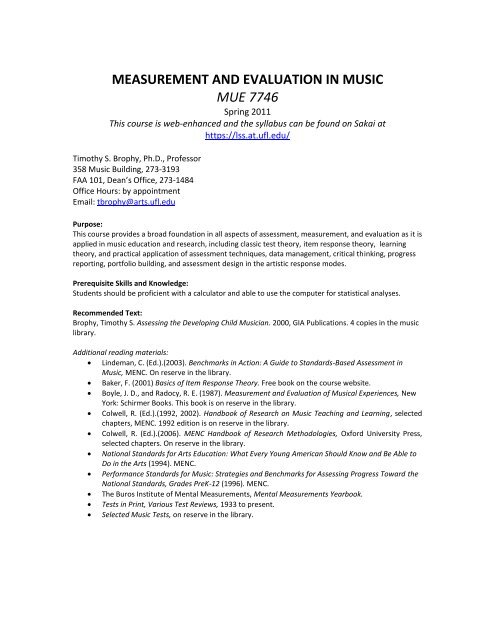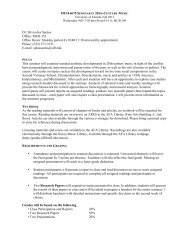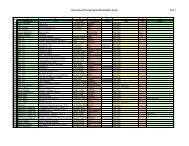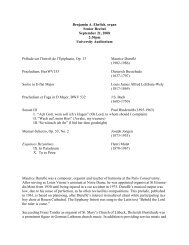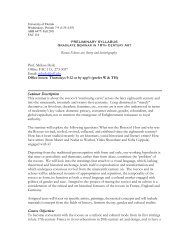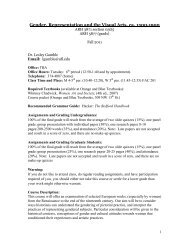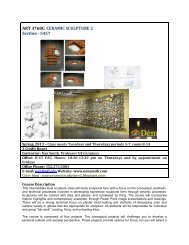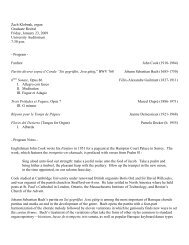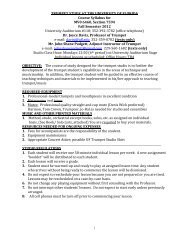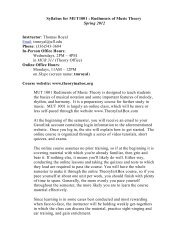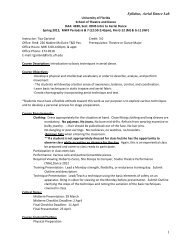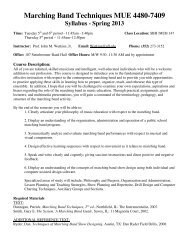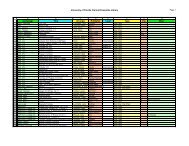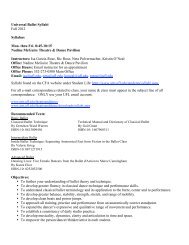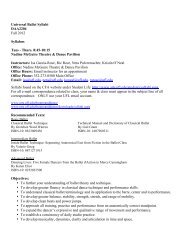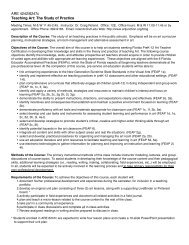MEASUREMENT AND EVALUATION IN MUSIC MUE 7746
MEASUREMENT AND EVALUATION IN MUSIC MUE 7746
MEASUREMENT AND EVALUATION IN MUSIC MUE 7746
You also want an ePaper? Increase the reach of your titles
YUMPU automatically turns print PDFs into web optimized ePapers that Google loves.
<strong>MEASUREMENT</strong> <strong>AND</strong> <strong>EVALUATION</strong> <strong>IN</strong> <strong>MUSIC</strong><br />
<strong>MUE</strong> <strong>7746</strong><br />
Spring 2011<br />
This course is web-enhanced and the syllabus can be found on Sakai at<br />
https://lss.at.ufl.edu/<br />
Timothy S. Brophy, Ph.D., Professor<br />
358 Music Building, 273-3193<br />
FAA 101, Dean’s Office, 273-1484<br />
Office Hours: by appointment<br />
Email: tbrophy@arts.ufl.edu<br />
Purpose:<br />
This course provides a broad foundation in all aspects of assessment, measurement, and evaluation as it is<br />
applied in music education and research, including classic test theory, item response theory, learning<br />
theory, and practical application of assessment techniques, data management, critical thinking, progress<br />
reporting, portfolio building, and assessment design in the artistic response modes.<br />
Prerequisite Skills and Knowledge:<br />
Students should be proficient with a calculator and able to use the computer for statistical analyses.<br />
Recommended Text:<br />
Brophy, Timothy S. Assessing the Developing Child Musician. 2000, GIA Publications. 4 copies in the music<br />
library.<br />
Additional reading materials:<br />
� Lindeman, C. (Ed.).(2003). Benchmarks in Action: A Guide to Standards-Based Assessment in<br />
Music, MENC. On reserve in the library.<br />
� Baker, F. (2001) Basics of Item Response Theory. Free book on the course website.<br />
� Boyle, J. D., and Radocy, R. E. (1987). Measurement and Evaluation of Musical Experiences, New<br />
York: Schirmer Books. This book is on reserve in the library.<br />
� Colwell, R. (Ed.).(1992, 2002). Handbook of Research on Music Teaching and Learning, selected<br />
chapters, MENC. 1992 edition is on reserve in the library.<br />
� Colwell, R. (Ed.).(2006). MENC Handbook of Research Methodologies, Oxford University Press,<br />
selected chapters. On reserve in the library.<br />
� National Standards for Arts Education: What Every Young American Should Know and Be Able to<br />
Do in the Arts (1994). MENC.<br />
� Performance Standards for Music: Strategies and Benchmarks for Assessing Progress Toward the<br />
National Standards, Grades PreK-12 (1996). MENC.<br />
� The Buros Institute of Mental Measurements, Mental Measurements Yearbook.<br />
� Tests in Print, Various Test Reviews, 1933 to present.<br />
� Selected Music Tests, on reserve in the library.
<strong>MUE</strong> <strong>7746</strong> Spring 2010<br />
Course Objectives<br />
Upon completing this course, the student will be able to<br />
� Describe and explain the principles of measurement;<br />
� Identify and compare frequently used standardized music aptitude tests, music achievement tests,<br />
and music performance tests;<br />
� Evaluate in detail any given instrument constructed to measure musical responses;<br />
� Analyze test data and interpret the results with accuracy;<br />
� Select and explain the rationale for selecting appropriate music tests for specific purposes;<br />
� Discuss the impact of testing on music education research and curriculum;<br />
� Discuss the role of performance-based assessments in arts education;<br />
� Describe the role of technology in music assessment;<br />
� Suggest ways to construct and evaluate music portfolios;<br />
� Construct, administer, and evaluate an original music test.<br />
Attendance Policy<br />
Attendance is expected at each class. Absenteeism will be handled on a case-by-case basis.<br />
Grading<br />
Grading Criteria:<br />
Assignment 1, Reliability and Validity 10%<br />
Assignment 2, Classical Test Theory Exercise 10%<br />
Assignment 3, KR20 Exercise 10%<br />
Assignment 4, Large Scale Test Review 10%<br />
Assignment 5, Final Topic 5%<br />
Assignment 6, IRT Analysis Exercise 10%<br />
Assignment 7, Tests in Music Education 10%<br />
Assignment 8, Assessment Task 10%<br />
Assignment 9, Research Project 25%<br />
100%<br />
The exams will require the use of a calculator or computer program.<br />
Grading Scale:<br />
94-100 = A<br />
92-93 = A-<br />
90-91 = B+<br />
82-89 = B<br />
84-85 = B-<br />
82-83 = C+<br />
2<br />
78-81 = C<br />
76-77 = C-<br />
74-75 = D+<br />
70-73 = D<br />
68-69 = D-<br />
67↓ = E<br />
Assignments (all are posted on the Sakai course website).<br />
1. Reliability and Validity Exercises. Due online by 5pm January 18, 2011.<br />
2. Classical Test Theory exercise. Due online by 5pm January 25, 2011.<br />
3. KR20 Exercise. Due online by 5pm February 3, 2011.<br />
4. Large-Scale Music Test review. Due online by 5pm, February 10, 2011.<br />
5. Final Topic. Due by 5pm March 24, 2011.<br />
6. IRT Analysis Exercise. Due by 5pm February 24, 2011.<br />
7. Tests in Music Education. Due online by 5pm<br />
8. Assessment Task. Due online by 5pm March 31, 2011.<br />
9. Major project. Due online by 5pm April 7, 2011.
<strong>MUE</strong> <strong>7746</strong> Spring 2011<br />
Assignment 9 - Major Project – due online by 5pm 4/7/11 – presentations 4/14/11<br />
Topics for this project are due online by 5pm on February 24, 2011. IRB approval is not needed.<br />
Each student will choose an area of testing which is not available on the market (do not develop an aptitude test!),<br />
do the necessary background research, construct and administer a test to a sample of subjects. The student will<br />
analyze the results of this test, interpret them carefully and in detail, and relate them to previous research results<br />
as well as evaluation techniques. The test and its results will be presented to the class and written as a research<br />
article in APA style. The project must include test items, test instructions or a test manual, answer forms and all<br />
necessary audio-visual aids. Students may wish to construct tests that can be used in their own teaching situations<br />
or to relate this project to a research topic.<br />
Major Project Presentations – April 14, 2011<br />
You will be given 20 minutes to present your project. You must provide a 1-2 page handout for each class member,<br />
and prepare a PowerPoint presentation that provides an overview of: the background of your test, the test<br />
development, the items, your results, and how you will use the results to revise and strengthen the reliability and<br />
validity of your test.<br />
Exams<br />
There are no exams in this course.<br />
University Required Statements:<br />
Students Requesting Accommodations due to Disabilities<br />
Students requesting classroom accommodation must first register with the Dean of Students Office. The Dean of<br />
Students Office will provide documentation to the student who must then provide this documentation to the<br />
Instructor when requesting accommodation.<br />
Academic Honor Policy<br />
It is expected that you will exhibit ethical behavior concerning your work in this class. Students are expected to do<br />
their own work, use their own words in papers, and to reference outside sources appropriately. Failure to uphold<br />
the standards of academic honesty will result in the appropriate disciplinary action.<br />
As a result of completing the registration form at the University of Florida, every student has signed the following<br />
statement:<br />
“I understand that the University of Florida expects its students to be honest in all their academic work. I agree to<br />
adhere to this commitment to academic honesty and understand that my failure to comply with this commitment<br />
may result in disciplinary action up to and including expulsion from the University.”<br />
We, the members of the University of Florida community, pledge to hold ourselves and our peers to the highest<br />
standards of honesty and integrity.<br />
Furthermore, on work submitted for credit by UF students, the following pledge is either required or implied:<br />
“On my honor, I have neither given nor received unauthorized aid in doing this assignment.”<br />
3
<strong>MUE</strong> <strong>7746</strong> Spring 2011<br />
Course Calendar<br />
This calendar will be adjusted as needed.<br />
Summary:<br />
Weeks 1-4, January 6-27 – Psychometric Foundations and Classic Test Theory<br />
Weeks 5-9, February 3-March 3– Introduction to Item Response Theory (IRT)<br />
Week 10 – March 8-12 - Spring Break (3 rd ISAME, Bremen, Germany, March 8-11, 2011)<br />
Weeks 11-16, March 17-April 14, 2011: Assessment in Public Schools (Brophy book)<br />
WEEK TOPIC READ<strong>IN</strong>G (online materials are on the course website)<br />
Week 1<br />
Week 2<br />
Week 3<br />
Week 4<br />
Week 5<br />
Week 6<br />
Introduction to Testing Today<br />
Psychometric Foundations 1<br />
Psychometric Foundations 2 – Correlation,<br />
Reliability, Validity<br />
Developing Tests<br />
Item Analysis 1<br />
Selecting and Using Standardized Tests<br />
Derived Scores; Norms; Types of Tests<br />
The Test Manual<br />
Item Analysis 2<br />
Assignment 1: Validity and Reliability, due<br />
5pm January 18<br />
Music Tests: Aptitude tests; Achievement<br />
tests; Administering a Standardized Music<br />
Test<br />
Evaluation of Music Ability<br />
Assignment 2 – Classical Test Theory Exercise<br />
due 5pm January 25<br />
Review – Classical Test Theory<br />
Assignment 3 – KR20 Analysis Exercise<br />
Item Response Theory – Item characteristic<br />
curves<br />
Assignment 4 – Large-Scale Music Test<br />
Review<br />
4<br />
Identifying Key Issues for Assessment in Music<br />
Education, Edmund, Burcham, Birkner, and Heffner,<br />
2007 ISAME Proceedings; Frameworks, Models, and<br />
Designs: Key Issues for Assessment in Music Education,<br />
Vaughan, Edmund, Holmes, and LaCognata, 2009<br />
ISAME Proceedings<br />
Boyle and Radocy, 1987, Chapter 3, 51-72<br />
The Florida Music Assessment Project, Brophy, 2007<br />
ISAME Proceedings<br />
Item Specifications handout, online<br />
Item Analysis handout, online<br />
Large Scale Assessment of Music Performance, Shuler,<br />
2007 ISAME Proceedings<br />
Boyle and Radocy, 1987, Chapter 3, 72-81<br />
FMA Test Manuals, online<br />
Item Analysis Exercises, online<br />
Assessment’s Potential in Music Education, Colwell,<br />
2006 MENC Handbook of Research Methodologies, pp.<br />
199-269 (handout)<br />
The Development and Validation of a Measurement<br />
Tool for Assessing Students’ Ability to Keep a Steady<br />
Beat, Nierman, 2007 ISAME Proceedings<br />
Evaluation of Musical Ability, J. David Boyle, Handbook<br />
of Research on Music Teaching and Learning, 1992,<br />
MENC , pp. 247-265<br />
Basics of Item Response Theory, Chapters 1-2, Baker,<br />
online
<strong>MUE</strong> <strong>7746</strong> Spring 2011<br />
Week 7<br />
Week 8<br />
Week 9<br />
IRT 2: Estimating Item Parameters and The Test<br />
Characteristic Curve<br />
Assignment 5 - Final project topic<br />
Estimating an Examinee’s Ability<br />
Assignment 6 – IRT Analysis Exercise<br />
IRT wrap-up: Comparing IRT and Classic Test Theory:<br />
Which is better for music education?<br />
Assignment 7 – Tests in Music Education<br />
Week 10 – Spring Break March 7-11, 2011<br />
Week 11 Assessment versus Testing<br />
Terms, and developing a personal philosophy of<br />
assessment; learning theory and its impact on<br />
assessment in music; authentic and alternative<br />
assessment; preparing for assessment in the<br />
classroom: targeting behaviors (concepts/skills),<br />
and developing scoring strategies (rubrics, etc.);<br />
assessable components; the national content<br />
standards for music.<br />
Week 12 Assessing Musical Performance and Musical<br />
Creativity<br />
Techniques for designing, implementing, and<br />
scoring assessments of artistic performance;<br />
performance components; discussion of research<br />
that informs about developmental changes that<br />
affect performance.<br />
Assessable components for creative artistic<br />
products, task parameters, models for assessing<br />
composition and improvisation, assessment<br />
practice with video and student examples.<br />
5<br />
Basics of Item Response Theory, Chapters 3-4-<br />
5, Baker, online<br />
The development of competency models: An<br />
IRT-based approach to competency assessment<br />
in general music education, Jordan & Knigge,<br />
paper for 2009 ISAME, on Sakai<br />
Basics of Item Response Theory, Chapters 3-4-<br />
5, Baker, online<br />
The development of competency models: An<br />
IRT-based approach to competency assessment<br />
in general music education, Jordan & Knigge,<br />
paper for 2009 ISAME, online<br />
No additional reading<br />
Assessing the Developing Child Musician,<br />
Brophy, Chapters 1 and 2<br />
Assessing the Developing Child Musician,<br />
Brophy, Chapters 3, 4
<strong>MUE</strong> <strong>7746</strong> Spring 2011<br />
Week 13 Assessing Musical Response and Critical Thinking<br />
Discuss and define critical thinking in music;<br />
critical thinking processes in music; reflection,<br />
metacognition, and procedural application<br />
thinking directions; finding product evidence of<br />
critical thinking processes; concept mapping;<br />
portfolio building; progress reporting to parents.<br />
Assignment 8: Design one task for classroom use<br />
(your choice – performing, creating, or<br />
responding) and its rubric, due online by 5pm<br />
March 31, 2011.<br />
Assignment 9: Final Projects due online by 5pm<br />
on April 7, 2011.<br />
Week 14 Portfolios and Profiles: Tying it All Together<br />
Implementing a Total Assessment Program<br />
The student will view student music portfolios,<br />
models for alternative progress reporting to<br />
parents, and discuss task administration<br />
procedures, piloting and benchmarking tasks,<br />
steps for implementing a total assessment<br />
program<br />
Week 15<br />
Present Major Projects April 14, 2011<br />
6<br />
Assessing the Developing Child Musician,<br />
Brophy, Chapter 5<br />
Assessing the Developing Child Musician,<br />
Brophy, Chapters 6-7


